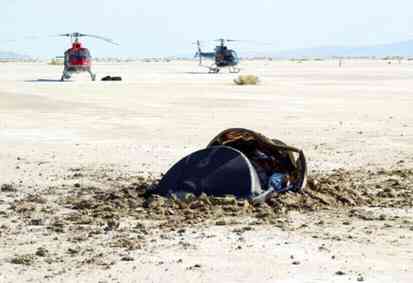Search this Site







President's Message:
Not Because They Are Easy. . .
By Steve Bartlett
On September 8, the Genesis solar sample return capsule crashed into the Utah desert after its parachutes failed to deploy during the final phase of its descent to Earth. The $264 million mission spent three years flying out to reach its destination between the Earth and Sun, collecting solar particles, and then returning to the US. Preliminary indications are that six pyrotechnic charges on the craft failed to fire, thereby keeping the parachutes inside their protective cannisters.
 |
| Not quite a mid-air recovery for the Genesis solar sample return. Photo credit: USAF 388th Range Sqd. |
The failure of this mission underscores a hard lesson that space explorers and enthusiasts have had to learn time and again: working in space is hard and unforgiving of mistakes.
From the fiery loss of the Space Shuttle Columbia and her crew last year to the launch failure of the Israeli Shavit booster on September 7, we are reminded that space work is risky business and the costs can be very high indeed. Some recent failures include the explosion of the Rubicon 1 rocket, Space Transport Corp.'s entry into the X-Prize competition and the crash of an Armadillo Aerospace's rocket during a hover test after running out of propellant.
We are nearing the half-century mark of spaceflight and in all of that time there have been just few launch systems with a perfect launch record. Both manned and unmanned spacecraft have been lost to accidents, misjudgements, or design and manufacturing flaws. Sometimes these problems appear immediately and cause a failure during launch, while other times the shortcoming doesn't appear until years later. Either way, the space environment has been fairly unforgiving.
And even when a problem is fixable, it can still cause serious concerns. Recent problems with oxygen generator failures, balky spacesuit cooling systems, and leaky windows have caused the crew aboard the International Space Station difficulties. When X-Prize contender Scaled Composites Corporation sent their pilot Mike Melville on his historic rocketplane flight to the edge of space in June, a control system problem sent the craft miles off course and dramatically reduced its maximum altitude.
This is not to say that we shouldn't be in space or that the costs and risks are too high. Great achievements only come when we take great risks. And sometimes we or our representatives have to pay a great cost. But we should realize that the margins in getting to space are slim and our current technologies are just barely able to put people and hardware there. It’s not easy. It’s not simple. And, for now, it’s not very cheap. But it can be done. To borrow a line from JFK,
We do these things not because they are easy, but because they are hard.
Time and again we've learned that we're better for having taken those risks and pushing those limits.
Copyright © 1998-2005 Organization for the Advancement of Space Industrialization and Settlement. All Rights Reserved.